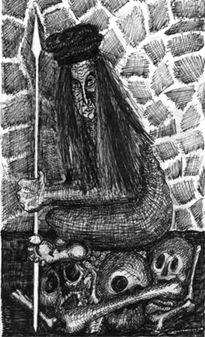The Sorcerer's Companion: A Guide to the Magical World of Harry Potter (64 page)
Read The Sorcerer's Companion: A Guide to the Magical World of Harry Potter Online
Authors: Allan Zola Kronzek,Elizabeth Kronzek
Title page from the 1672 London edition of Nostradamus’ Prophecies
. (
photo credit 69.4
)
In the ensuing centuries, scholars have pored over every syllable penned by the seer and decided that many of history’s most momentous events were predicted by Nostradamus: These include the French Revolution, the Great Fire of London, the rise of Napoleon, Hitler, and Mussolini, the Battle of Waterloo, the World Wars, the invention of nuclear weapons, and men walking on the moon. Skeptics point out that because of the veiled way the prophecies are written (combining symbolic and ambiguous language with occasional specific references), it is possible to read into them a wide range of meanings and events. Indeed, different scholars have used the advantage of hindsight to attribute widely different meanings to the same verses. It is also true that if you make enough predictions concerning floods, famines, wars, and other catastrophes, some of them are bound to come true. Nevertheless, taken as a whole, the prophecies of
Centuries
have an air of mystery and profundity that fascinates us to this day.

Cassandra was the first great prophetess of Greek mythology—but with an ironic twist to her story. She could see the future with crystal clarity—the outcome of wars, the murder of kings, even her own terrible fate—yet her gift counted for nothing. No matter how clearly she spoke, nobody believed her.
Cassandra was the beautiful daughter of Priam and Hecuba, king and queen of the ancient city of Troy. She received her gift of foresight from Apollo, the god of prophecy, who was also the one who made it useless. This came about because Apollo, who was often enamored of female mortals, was smitten by Cassandra’s beauty and decided to woo her. Some suitors bring flowers and candy; Apollo offered Cassandra prophecy. It’s not precisely clear what happened next; we know Cassandra accepted the gift. But had she promised to return Apollo’s affections in exchange for the gift, as some tell the story? Or did Apollo misread the situation and expect something that was never promised? Either way, the god wasn’t pleased when Cassandra failed to respond to his advances. He could have taken the gift back. Instead, possessing a cruel streak, he ordained that nothing she said would be believed. (Harry knows well how that feels!)
It was a terrible and tragic fate. For the rest of her days, Cassandra would be able to see calamities in the making—but all of her warnings would be laughed off, ignored, or not heard; she was even thought mad and locked away. In the best known of her disregarded prophecies, Cassandra foretold the fall of Troy and the destruction of her people. She foresaw that the great wooden horse outside the city gates was not a gift from the Greeks but a trick (the horse was filled with enemy soldiers who would soon sack and pillage the city). Captured by the victorious King Agamemnon and taken back to the court of Argos, Cassandra prophesied the king’s murder as well as her own.
Cassandra’s sad tale was told by many Greek poets and playwrights and appears in Virgil’s
Aeneid
and Shakespeare’s
Troilus and Cressida
. Today the name Cassandra has come to mean “a prophet of doom.”

 any an American train traveler has eagerly sought the services of a redcap—a helpful porter who will carry your luggage through the station. Riders of the Hogwarts Express, however, know well enough to keep their distance from red caps—at least the terrifying kind studied in Defense Against the Dark Arts. Also called a “bloody cap” or “red comb,” a red cap is an evil
any an American train traveler has eagerly sought the services of a redcap—a helpful porter who will carry your luggage through the station. Riders of the Hogwarts Express, however, know well enough to keep their distance from red caps—at least the terrifying kind studied in Defense Against the Dark Arts. Also called a “bloody cap” or “red comb,” a red cap is an evil
goblin
of English folklore that haunts the ruins of castles where bloody battles have occurred. With his long gray hair, fiery red eyes, and protruding teeth, the red cap might be mistaken for a very ugly old man, were it not for his distinctive red hat, which gains its color by being soaked in blood. He carries a walking stick tipped with a metal spike, and will happily use it against anyone foolish enough to wander into a ruined castle. After all, the blood of a fresh victim is just what’s needed to brighten the color of his crimson cap.

For those who can’t resist visiting old ruins, tradition holds there is one sure way to protect yourself against a red cap. Read the Bible aloud and he will utter a shriek and vanish, leaving behind one of his hideous teeth as a souvenir.


 f you’re interested in learning the ABCs of magic, or you want to read
f you’re interested in learning the ABCs of magic, or you want to read
The Tales of Beedle the Bard
in the original language, you might try signing up for a Hogwarts class on ancient runes. A series of characters and symbols drawn from the earliest known Germanic alphabet, runes have always been associated with
magic
and mystery. In fact, the word rune or
roun
means “mystery” or “secret” in Danish.


